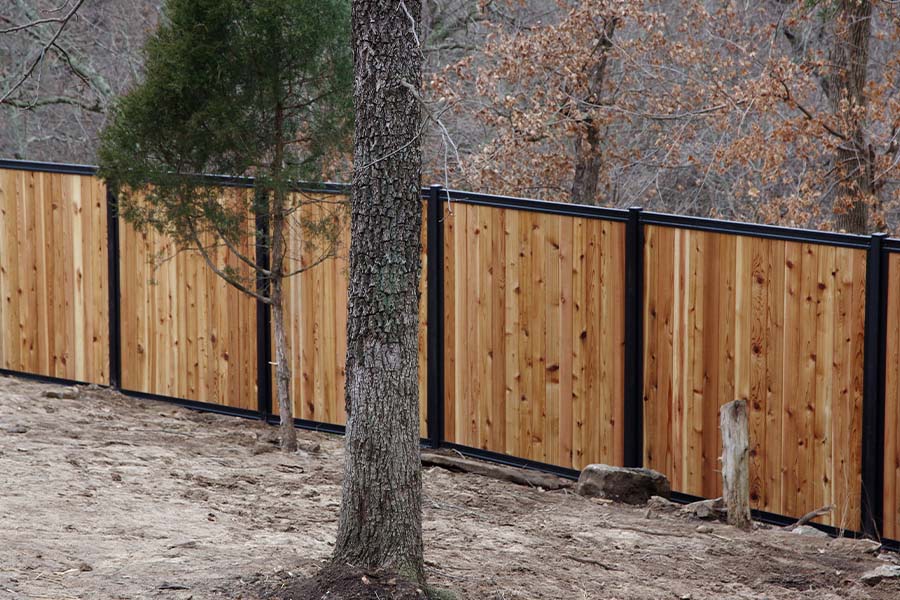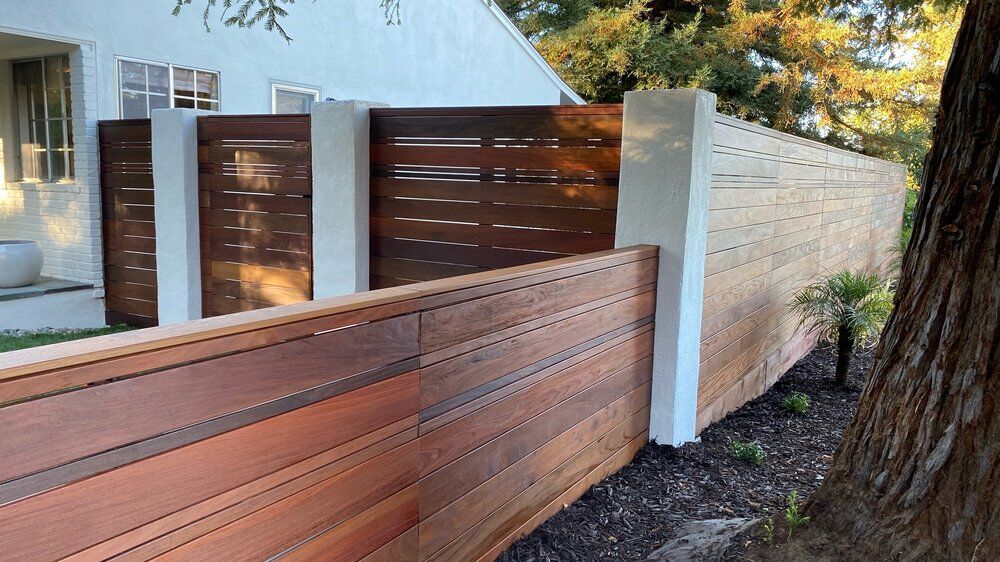All Categories
Featured
Picking the ideal secure fencing material for your residential or commercial property is a considerable choice, and each alternative comes with its own collection of advantages and obstacles. Timber, vinyl, and light weight aluminum are amongst the most popular materials for both industrial and residential fence. Below's a breakdown of the advantages and disadvantages of each to assist you determine which is best for your demands.
Timber Fencing. Pros:
Aesthetic Allure: Wood offers an ageless, natural look that complements almost any style of residential property. It can be painted or discolored in a large range of colors, allowing for full personalization. Whether you're going for a rustic, country-style look or a much more polished and sleek appearance, wood is versatile.
Affordable: Normally, wood fences are one of the most affordable alternatives when it comes to upfront costs. It's an excellent choice for those on a budget who want a high quality fencing without a high price.
![]()
Modification: Wood can be conveniently adapted to fit any type of form or dimension. You can pick from numerous designs such as personal privacy, picket, or ranch-style fences. It's additionally simple to change, repair, or change parts if necessary.
Disadvantages:
Upkeep: Wood fencings need normal upkeep. They should be stained or repainted periodically to avoid insect, warping, or rot infestation. Without upkeep, timber can weaken much faster, specifically in moist or damp climates.
Sensitivity to Damage: Wood is vulnerable to damage from insects, such as termites, and weather problems, like high winds, rain, or snow. With time, exposure to these components can create the wood to fracture, splinter, or warp.
Much Shorter Lifespan: While wood fencings can last for years, they usually have a shorter life expectancy contrasted to plastic or light weight aluminum, specifically if not kept on a regular basis.
Plastic Fencing. Pros:
Reduced Upkeep: Among one of the most attractive attributes of vinyl fences is that they need little to no upkeep. Unlike wood, plastic does not require to be repainted or discolored. It's immune to fading, cracking, and bending, making it optimal for those who desire a problem-free fence.
Sturdiness: Vinyl fencings are incredibly long lasting and can endure extreme climate condition, including severe warmth, hefty rainfall, or snow. They're additionally resistant to pests like termites, which can destroy timber fencings.
Lengthy Lifespan: Vinyl fences can last for 20-30 years or even more with minimal upkeep. Numerous suppliers use guarantees, providing assurance and further improving the value of your investment.
![]()
Selection of Styles: Available in a variety of colors, layouts, and structures, vinyl fences can mimic the look of timber yet without the upkeep. They are available stylishly like privacy, picket, and decorative, making them highly customizable.
Disadvantages:
Greater First Price: The ahead of time expense of vinyl fence is usually more than wood, making it less budget-friendly for some. Its durability and low maintenance make it a worthwhile financial investment in the lengthy run.
Weak in Cold Weather condition: In colder environments, vinyl can end up being weak gradually, which makes it more prone to breaking if based on influence. This could be a concern in locations with extreme winters months.
Minimal Modification: While vinyl comes in a selection of designs and colors, it's not as personalized as timber. If you have an extremely particular vision in mind, plastic may not be the ideal selection.
Aluminum Secure Fencing. Pros:
Low Maintenance: Light weight aluminum is an additional product that needs very little maintenance. Unlike timber, it does not rust, wear away, or discolor. This makes it excellent for settings with severe weather or seaside locations where deep sea might cause rust.
Toughness: Light weight aluminum fences are known for their toughness and long life expectancy. They can withstand harsh climate, and unlike wood or plastic, they are resistant to bugs and will not degrade gradually.
![]()
Visual Allure: Aluminum fences offer a sleek, stylish appearance and are usually utilized for ornamental purposes. They are offered in various designs and coatings and can boost the overall visual allure of your property.
Protection: Aluminum is a tough material, making it an outstanding alternative for supplying safety around your residential property. It's usually utilized for residential safety and security fence as well as for pool enclosures.
Cons:
Cost: Aluminum fencings are usually much more expensive than wood and in some cases also vinyl, especially when selecting decorative or custom-made styles. The initial price may be a deterrent for some homeowner.
Less Privacy: One of the drawbacks of aluminum is that it generally provides much less privacy compared to wood or vinyl. The gaps in between the bars or slats can be large, which permits people to translucent the fence. If personal privacy is very important to you, this may not be the very best choice.
Nicking: While light weight aluminum is resilient, it is prone to nicking from hefty influences, such as cars and truck mishaps or criminal damage. While it won't corrosion, a damage can jeopardize its look and integrity.
Which Product Should You Choose? The decision in between timber, aluminum, and vinyl secure fencing boils down to your budget plan, the amount of maintenance you want to handle, and the certain needs of your building. If you prefer a natural, personalized appearance and want to maintain it, timber could be the method to go. Vinyl supplies outstanding advantages if you focus on durability, longevity, and low-maintenance care. For those that desire a sophisticated, high-end appearance with marginal maintenance, light weight aluminum is a great alternative.
Consider your residential property's climate, the degree of personal privacy or protection you call for, and the long-lasting investment you agree to make. Whichever product you pick, each deals unique advantages that can enhance your home or company while giving capability and style.
Timber Fencing. Pros:
Aesthetic Allure: Wood offers an ageless, natural look that complements almost any style of residential property. It can be painted or discolored in a large range of colors, allowing for full personalization. Whether you're going for a rustic, country-style look or a much more polished and sleek appearance, wood is versatile.
Affordable: Normally, wood fences are one of the most affordable alternatives when it comes to upfront costs. It's an excellent choice for those on a budget who want a high quality fencing without a high price.

Modification: Wood can be conveniently adapted to fit any type of form or dimension. You can pick from numerous designs such as personal privacy, picket, or ranch-style fences. It's additionally simple to change, repair, or change parts if necessary.
Disadvantages:
Upkeep: Wood fencings need normal upkeep. They should be stained or repainted periodically to avoid insect, warping, or rot infestation. Without upkeep, timber can weaken much faster, specifically in moist or damp climates.
Sensitivity to Damage: Wood is vulnerable to damage from insects, such as termites, and weather problems, like high winds, rain, or snow. With time, exposure to these components can create the wood to fracture, splinter, or warp.
Much Shorter Lifespan: While wood fencings can last for years, they usually have a shorter life expectancy contrasted to plastic or light weight aluminum, specifically if not kept on a regular basis.
Plastic Fencing. Pros:
Reduced Upkeep: Among one of the most attractive attributes of vinyl fences is that they need little to no upkeep. Unlike wood, plastic does not require to be repainted or discolored. It's immune to fading, cracking, and bending, making it optimal for those who desire a problem-free fence.
Sturdiness: Vinyl fencings are incredibly long lasting and can endure extreme climate condition, including severe warmth, hefty rainfall, or snow. They're additionally resistant to pests like termites, which can destroy timber fencings.
Lengthy Lifespan: Vinyl fences can last for 20-30 years or even more with minimal upkeep. Numerous suppliers use guarantees, providing assurance and further improving the value of your investment.

Selection of Styles: Available in a variety of colors, layouts, and structures, vinyl fences can mimic the look of timber yet without the upkeep. They are available stylishly like privacy, picket, and decorative, making them highly customizable.
Disadvantages:
Greater First Price: The ahead of time expense of vinyl fence is usually more than wood, making it less budget-friendly for some. Its durability and low maintenance make it a worthwhile financial investment in the lengthy run.
Weak in Cold Weather condition: In colder environments, vinyl can end up being weak gradually, which makes it more prone to breaking if based on influence. This could be a concern in locations with extreme winters months.
Minimal Modification: While vinyl comes in a selection of designs and colors, it's not as personalized as timber. If you have an extremely particular vision in mind, plastic may not be the ideal selection.
Aluminum Secure Fencing. Pros:
Low Maintenance: Light weight aluminum is an additional product that needs very little maintenance. Unlike timber, it does not rust, wear away, or discolor. This makes it excellent for settings with severe weather or seaside locations where deep sea might cause rust.
Toughness: Light weight aluminum fences are known for their toughness and long life expectancy. They can withstand harsh climate, and unlike wood or plastic, they are resistant to bugs and will not degrade gradually.

Visual Allure: Aluminum fences offer a sleek, stylish appearance and are usually utilized for ornamental purposes. They are offered in various designs and coatings and can boost the overall visual allure of your property.
Protection: Aluminum is a tough material, making it an outstanding alternative for supplying safety around your residential property. It's usually utilized for residential safety and security fence as well as for pool enclosures.
Cons:
Cost: Aluminum fencings are usually much more expensive than wood and in some cases also vinyl, especially when selecting decorative or custom-made styles. The initial price may be a deterrent for some homeowner.
Less Privacy: One of the drawbacks of aluminum is that it generally provides much less privacy compared to wood or vinyl. The gaps in between the bars or slats can be large, which permits people to translucent the fence. If personal privacy is very important to you, this may not be the very best choice.
Nicking: While light weight aluminum is resilient, it is prone to nicking from hefty influences, such as cars and truck mishaps or criminal damage. While it won't corrosion, a damage can jeopardize its look and integrity.
Which Product Should You Choose? The decision in between timber, aluminum, and vinyl secure fencing boils down to your budget plan, the amount of maintenance you want to handle, and the certain needs of your building. If you prefer a natural, personalized appearance and want to maintain it, timber could be the method to go. Vinyl supplies outstanding advantages if you focus on durability, longevity, and low-maintenance care. For those that desire a sophisticated, high-end appearance with marginal maintenance, light weight aluminum is a great alternative.
Consider your residential property's climate, the degree of personal privacy or protection you call for, and the long-lasting investment you agree to make. Whichever product you pick, each deals unique advantages that can enhance your home or company while giving capability and style.
Latest Posts
Check Out the Best Auto Repair Coupons in Montclare, Chicago
Published May 24, 25
1 min read
Secure Your Financial Investment with Specialist Seamless Gutter Setup
Published May 20, 25
1 min read
How Chicago Drivers Trust Montclare Auto Repair for Trusted Service and Great Savings
Published May 20, 25
1 min read
More
Latest Posts
Check Out the Best Auto Repair Coupons in Montclare, Chicago
Published May 24, 25
1 min read
Secure Your Financial Investment with Specialist Seamless Gutter Setup
Published May 20, 25
1 min read
How Chicago Drivers Trust Montclare Auto Repair for Trusted Service and Great Savings
Published May 20, 25
1 min read